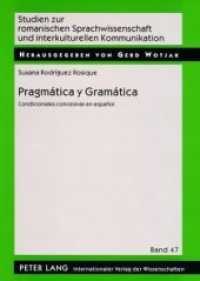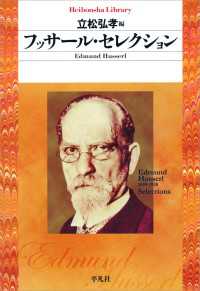- ホーム
- > 洋書
- > ドイツ書
- > Humanities, Arts & Music
- > History
- > general surveys & lexicons
Description
(Short description)
Sprache prägt Gesellschaft und umgekehrt, da Sprache soziale Beziehungen reflektiert oder als Deutungs- und Herrschaftsinstrument fungiert. Bei der Konstruktion der modernen Nation kommt ihr und ihrer Standardisierung und Institutionalisierung daher eine zentrale Rolle zu. In diesem Band gehen Philologen und Historiker der Rolle von Sprache als kulturpolitischem Vehikel am Beispiel Ostmitteleuropas nach. Thematisiert werden u.a. Fragen der Wörterbucharbeit, des Spannungsverhältnisses zwischen Statusplanung und Alltagspraxis, aber auch des institutionellen Umgangs mit Mehrsprachigkeit. Der Band untersucht am Beispiel Ostmitteleuropas die Rolle der Sprache als Vehikel der nationalen Differenzierung und Homogenisierung auf alltagspraktischer und institutioneller Ebene.
(Text)
Language has an immense effect on society - and vice versa. Language reflects social relations and also functions as an instrument of interpretation and power. In the development of the modern nation language has had the important role of standardizing and institutionalizing mores. In this volume philologists and historians study the role of language as a cultural and historical vehicle based on the example of Eastern Middle Europe. Other themes addressed include the preparation of dictionaries, the tense relationship between status planning and everyday practices, and the institutional approach to polyglotism.
(Text)
Language has an immense effect on society and vice versa. Language reflects social relations and also functions as an instrument of interpretation and power. In the development of the modern nation language has had the important role of standardizing and institutionalizing mores. In this volume philologists and historians study the role of language as a cultural and historical vehicle based on the example of Eastern Middle Europe. Other themes addressed include the preparation of dictionaries, the tense relationship between status planning and everyday practices, and the institutional approach to polyglotism.
(Author portrait)
Dr. Jan Surman ist wissenschaftlicher Mitarbeiter am Poletajew Institut für theoretische und historische Studien der Geisteswissenschaften an der Nationalen Forschungsuniversität Hochschule für Wirtschaft in Moskau, Russland.Václav Petrbok studierte Bohemistik an der Prager Karlsuniversität. Seit 1997 Wissenschaftlicher Mitarbeiter des Instituts für tschechische Literatur der Akademie der Wissenschaften der Tschechischen Republik in Prag. Seit 2017 Leiter des neu gegründeten Germanobohemistischen Teams. Lehrbeauftragter am Institut für germanische Studien der Karlsuniversität Prag.


![TENEBRAE - T02 - PHOEBOS- CYCLE DE TENEBRAE [POCHE] (TENEBRAE)](../images/goods/../parts/goods-list/no-phooto.jpg)




